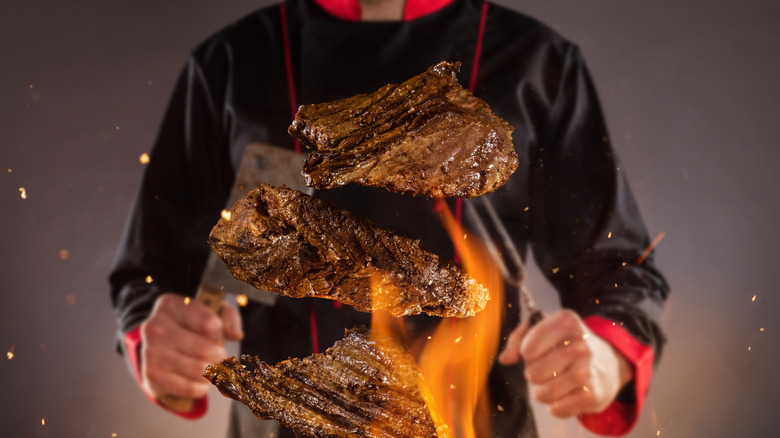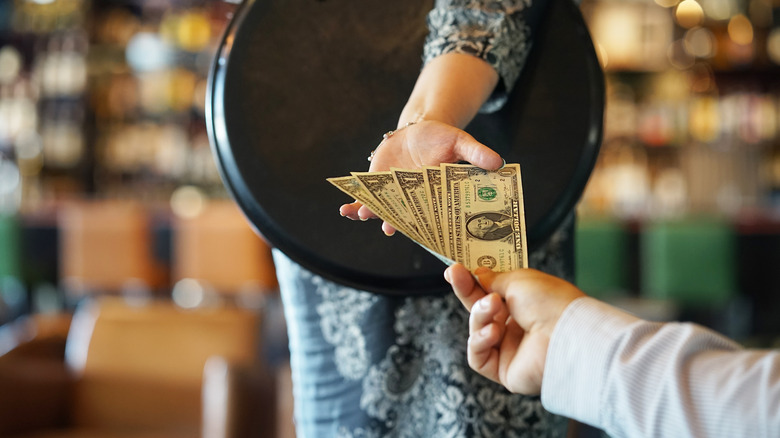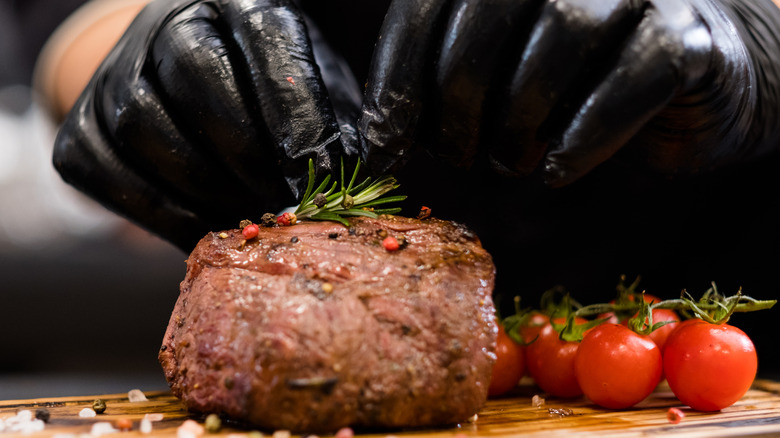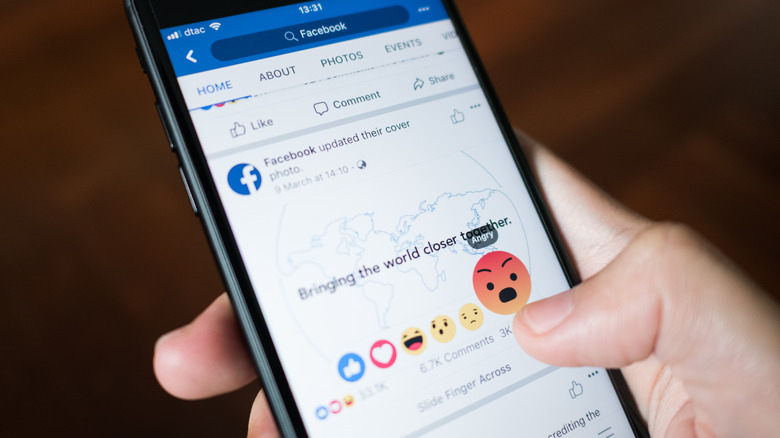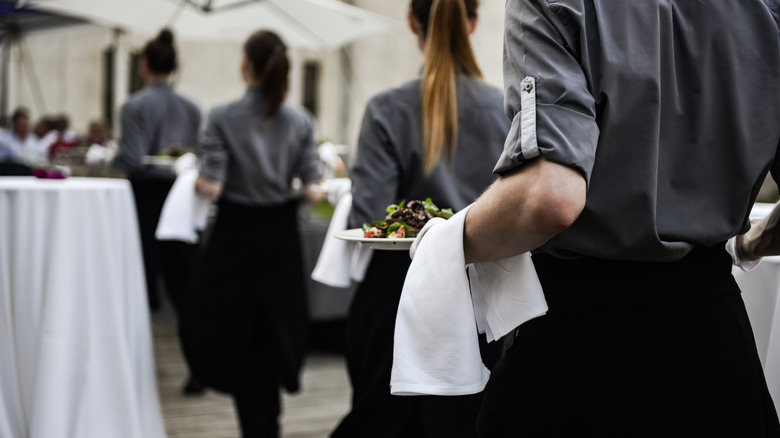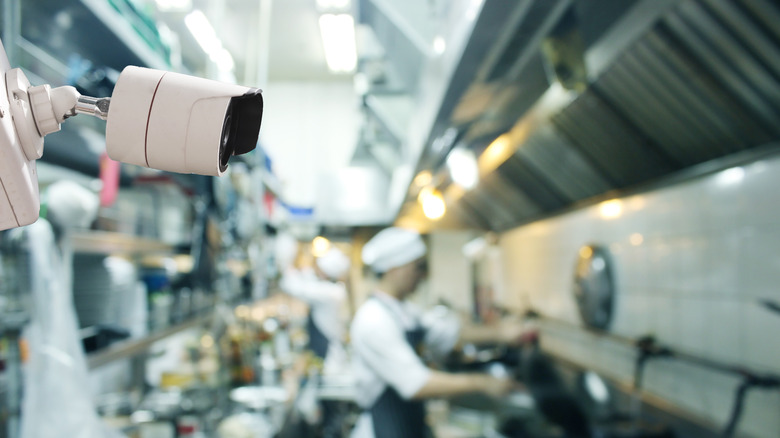Really Weird Rules Steakhouse Employees Are Forced To Follow
Visiting a steakhouse is a decadent affair. Between the crisp white tablecloths, the sweeping wine list, and the expertly-crafted cuisine, customer satisfaction is wholly guaranteed the moment you walk through the door. That's because this category of restaurants promotes a high standard of service, whether it's a suburban chain eatery or upscale establishment. If you know the time and money that goes into searing the perfect rib eye, you'll understand why manners reign above all else.
Due to this luxe reputation, ensuring the orderly conduct of steakhouse employees is of utmost importance. Dress codes are to be followed, proper dining etiquette is practiced, and the food is prepared by highly-trained chefs with years of training behind them. Not every steakhouse is this fancy, but even your neighborhood LongHorn and Outback expect some level of professionalism from the workers who keep the restaurants afloat night after night. What's unexpected, however, are the policies that bind steakhouse employees on the job. Let's dig into some of the weirder rules staff are forced to follow.
They have to share their tips
It's common knowledge restaurants work together to make the entire experience happen. Hosts handle reservations, chefs make the food, and servers guide the meal from start to finish. But instead of pocketing their keep after a shift, workers are forced to share their tips. Staff participate in tip pooling, a system that combines all earnings into a collective pot split equally among employees, per On the Line. Tip pooling might make sense for casual dining spots that foster a collaborative working environment — think coffee shops or bakeries — but this isn't exactly the case for steakhouses, where employees perform specific roles in order to produce a quality dining experience.
One restaurant to implement the policy — and go to court over it — is Outback Steakhouse. In Kilgore vs. Outback Steakhouse of Florida, servers argued to the US Court of Appeals that the restaurant's use of the tip pool violated the Fair Labor Standards Act (FLSA), as the mandatory 3% sum regularly cut into servers' take-home pay. The court ruled in Outback's favor. Their reasoning? Since employees never received anything less than the minimum wage in spite of the tip pool, the restaurant wasn't technically withholding any of the wages they would otherwise receive.
In some restaurants, servers can't talk to the chefs
Steakhouse employees deal with a lot of weird rules, but this one might be the weirdest: Servers can't talk to the kitchen staff. On TalesFromYourServer, Reddit users testified to the divide separating line cooks and waitstaff at fancier establishments. One person who worked at a casual fine dining spot revealed servers were not to disturb the chefs for any reason. "The place I'm at now is pretty relaxed," they added, "but I've worked in kitchens where you can't even look at/talk to the chefs/cooks." Another person referred to this phenomenon as "the cone of silence," despite the cooks in question gladly spending time with them off the clock.
There's no doubt the stereotype of the snooty, standoff-ish chef pervades pop culture. However, there may be a rationale behind the cold shoulder that isn't simply about ego. One commenter explained that the hectic atmosphere of a professional kitchen can be disorienting for those working in it. Between clanging cookware, hissing stoves, and orders being hurled over the din, line cooks don't have the mental bandwidth to grill porterhouses to perfection while also assisting the waitress with a picky customer. In other words, better to save those questions for the manager.
They can't talk about customers online
For anybody who's waited tables in their time, venting about customers is a normal, even healthy, part of the job. However, steakhouse employees have to be extra careful about how they air their grievances to the world, especially digitally. In 2018, an Outback employee in Florida was fired from their role after posting about a customer interaction online. As Inc. reported, the employee took to social media after the guest, a megachurch volunteer, placed a takeout order for over $700 worth of food without leaving a tip. The frustration fueling their Facebook post ended up circling back to the customer, who tried following up with the restaurant to correct the matter.
The result? Not only did Outback refund the customer's order, but they dismissed the employee on the grounds that they actually violated a company-wide policy. According to the chain, talking about customers online is off-limits, and doing so could have negative consequences, like losing your job. Besides sparking a discussion on tipping etiquette (standard gratuity is 20%, according to Eater), the incident also revealed the lengths a steakhouse will go in preserving its image, even if it comes at the expense of its employees. Was the employee's complaint justified? Absolutely. But perhaps a social media status update might not be the best way to go about it.
Steakhouse employees work at a set pace
From refilling glasses to wiping down tables, multitasking is crucial in any dining establishment. But steakhouse employees are forced to follow a rigid schedule to keep business flowing. At Outback Steakhouse, for example, waiters are expected to work at a timed pace for each table they serve. A training manual from 2014 outlines each task in chronological order, as well as how long the server should take to complete them. For a "total dining experience," servers should greet customers for 30 to 45 seconds, and the table should receive their drinks and honey wheat Bushman bread within three minutes. To see whether the guest's Victoria's Filet Mignon is up to snuff, the "two bite check back" is listed shortly after the entrée is served.
Overall, the entire process takes 12 steps and clocks in at 48 to 50 minutes, give or take. Outback is a single chain with these rules, but steakhouses tend to run a tight ship in the name of exceptional customer service, and time management is one part of that. Of course, providing timely service is a necessity at any restaurant, but Outback's emphasis on "urgency and skill" takes the chain eatery to a totally different level.
They keep serving customers after closing
When a restaurant closes for the night, most assume they immediately kick everyone out and lock the doors so they can prepare for the next day, right? Not the case at steakhouses, apparently. According to Reddit's TalesFromYourServer, it's normal for steakhouse employees to serve customers after hours, as long as they're still dining on the premises. "You have to have your butt in a seat by closing (9 p.m. in my case), but we will continue to serve until everyone is finished eating," one person said, with the caveat that walk-ins after that would not be admitted. Another person recounted a touristy steakhouse that allowed them to reserve a table at their 10 p.m. closing time, since the restaurant considered that the cut-off for service.
Between the upscale clientele and nightlife association steakhouses have, stretching the rules for customers mid-meal doesn't seem unreasonable. But the accommodating nature, as some Reddit users brought up, could be taken advantage of by those less considerate of boundaries. No one wants to be stuck waiting on that oblivious diner who views the restaurant as their own personal kitchen and doesn't take the hint.
Employees might have to get used to being watched
Workers are well aware of the fact that restaurants monitor their behavior. But those on the outside might not realize how often steakhouse employees may be watched over the course of a shift. Case in point, an Outback Steakhouse in Oregon considered implementing a strict method of workplace surveillance. In 2019, the Portland-based franchise floated plans to test out a new software program for tracking employee movement. PrestoVision, according to Wired, would screen factors such as dining room activity, serving times, and interactions between staff and customers via machine-learning techniques at a single restaurant location. Managers would then sift through the collected data to pinpoint areas that needed improvement.
While the restaurant's reasoning for using AI seemed reasonable on the surface — who would argue against improvement? — the Orwellian idea immediately sparked controversy. Reactions to the news were humorous: a Facebook comment under an article from Willamette Week asked "Wouldn't it technically be "Big Mate?" instead of Big Brother. But many condemned the restaurant for not respecting employees' and customers' privacy, calling it "slimy" and "overreach on the part of employers." Big Brother jokes aside, it inspired enough backlash to make the franchise shelve the plans for good (via Eater).
